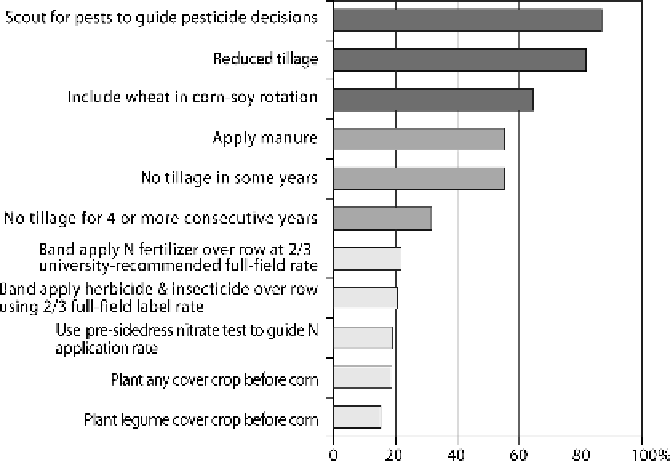Agriculture Reference
In-Depth Information
Figure 13.2
. Percentage of Michigan corn-soybean farmers reporting current use of
selected practices (n = 1408).
A second group of conservation practices were used by 55-65% of the farmers
(Fig. 13.2). These included no-till in some years (but not continuously), applying
manure, and including wheat in rotation with corn and soybean crops. What made
this second category of practices slightly less attractive? No-till planting reduces
weed control options (particularly for farmers not using glyphosate-tolerant crops,
still a notable number at the time of the survey). Applying manure can compete
for time with other farming tasks. As for why a third of respondents opted not to
include any wheat in the corn-soybean rotation, three explanations came from the
focus group participants: (1) wheat can be less profitable than corn or soybean,
(2) wheat diseases in Michigan can reduce yield and grain quality, and (3) demand
for white winter wheat had declined at local grain elevators. The common element
among these three common but not ubiquitous practices is that under certain cir-
cumstances, all had the potential for reduced revenues, higher costs, or greater labor
demand during busy periods.
A third group of conservation practices appealed to less than a third of the focus
group farmers (Fig. 13.2). These practices were viewed by many as fundamentally
problematic for one reason or another. Winter cover crops were widely perceived
to delay or complicate spring planting by two mechanisms: (1) the need to allow
cover crops sufficient time to accumulate spring biomass without reducing soil
moisture excessively, and (2) the need to kill the cover crop prior to crop plant-
ing. The pre-sidedress nitrate test, a just-in-time test to estimate nitrogen fertilizer
needs after the corn is up and growing, also confronted the timeliness problem—
soil must be sent to a laboratory for analysis, which can delay fertilizer decisions
and make equipment scheduling more difficult, especially when weather is poor

